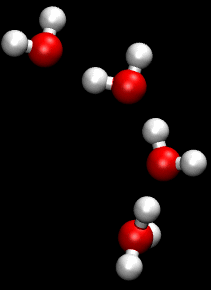Kation Zundela – Wikipedia, wolna encyklopedia



Kation Zundela, H5O+2 − rodzaj jonu oksoniowego, jedna z form hydratowanego protonu. Powstaje poprzez przyłączenie kationu wodorowego H+ do dwóch cząsteczek wody H2O, w myśl równania:
- H+ + 2H2O ⇌ H5O+2
W kationie Zundela nadmiarowy proton fluktuuje pomiędzy dwiema cząsteczkami wody, przeskakując od jednej do drugiej i z powrotem. Istnieniem wspomnianej fluktuacji można tłumaczyć mechanizm transportu protonów przez błony biologiczne w kanałach protonowych.
Zobacz też
[edytuj | edytuj kod]- Georg Zundel
- kation Eigena (H9O+4)
Bibliografia
[edytuj | edytuj kod]- Georg Zundel. Hydrogen Bonds with Large Proton Polarizability and Proton Transfer Processes in Electrochemistry and Biology. „Advances in Chemical Physics”, s. 1-217, 1999. DOI: 10.1002/9780470141700.ch1.
- Georg Zundel, Bogumił Brzezinski. Hydrogen-Bonded Chains with Large Proton Polarizability due to Collective Proton Motion – Pathways for Protons in Biological Membranes. „Polish J. Chem.”. 72, s. 172-192, 1998.
- Eckert, Michael, Zundel, Georg. Energy surfaces and proton polarizability of hydrogen-bonded chains: an ab initio treatment with respect to the charge conduction in biological systems [Erratum to document cited in CA109(25):224845m]. „The Journal of Physical Chemistry”. 93 (13), s. 5324-5324, 1989. DOI: 10.1021/j100350a056.
- Georg Zundel: Easily Polarizable Hydrogen Bonds – Their Interactions with the Environment – IR Continuum and Anomalous Large Conductivity. W: P. Schuster, G. Zundel, C. Sandorfy (red.): The Hydrogen Bond – Recent Developments in Theory and Experiments. T. II. North Holland Publ. Co., 1976, s. 683-766.
- Huczyński, Adam, Przybylski, Piotr, Brzezinski, Bogumil, Bartl, Franz. Spectroscopic and Semiempirical Studies of a Proton Channel Formed by the Methyl Ester of Monensin A. „The Journal of Physical Chemistry B”. 110 (31), s. 15615-15623, 2006. DOI: 10.1021/jp062160o.
- Water Structure and Science: Water ionization and pH. www.lsbu.ac.uk. [dostęp 2014-01-11].
- Zundel Georg: Hydrogen bonds and hydrogen-bonded systems with large proton polarizability their importance in electrochemistry and biology. nte-serveur.univ-lyon1.fr. [dostęp 2014-01-11]. [zarchiwizowane z tego adresu (2007-08-15)].


 French
French Deutsch
Deutsch